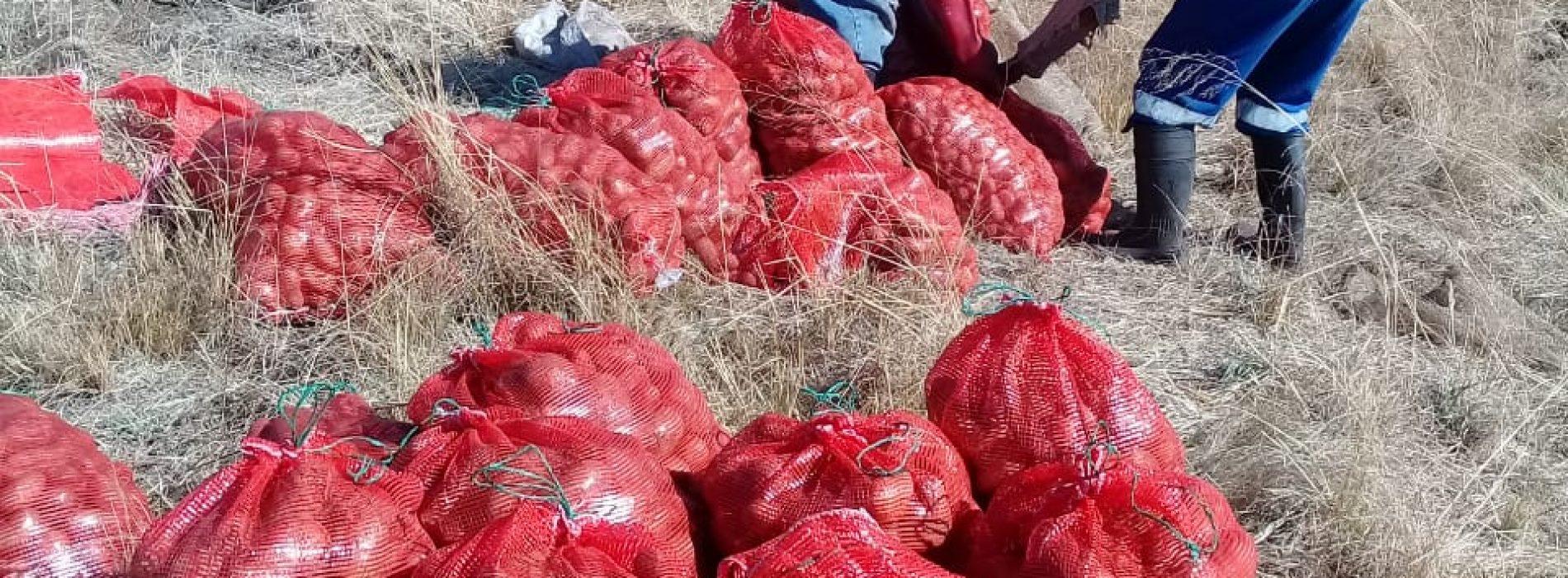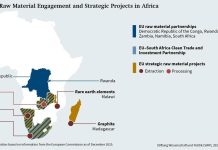Africa-Press – Lesotho. WHEN Seed 365, a farming company, started operations in a beautiful valley on the banks of Maletsunyane River in December last year, the journey ahead looked very bright. Though climate change was already posing a serious challenge to farmers, they were yet to fully appreciate the gravity of the phenomenon.
A few weeks after planting potato seeds, heavy rains hit the company’s farm in Semonkong, a mountainous region bordering Maseru, Mafeteng and Mohale’s Hoek districts and widely known for potato production.
This was during a period when heavy rains were no longer expected, going by the trends of past seasons. “Potatoes do not like a lot of rain, the amount of rainfall in itself was already a challenge but the overflowing of the river was a blow,” said Thapeli Tjabeli, Seed 365 managing director.
“Some of the seeds were washed away by the overflowing river,” he said. While still dealing with the impact of the rains, an early frost hit.
Not giving up, the company continued to care for the remaining crop and tried by all means to minimise further damage. The harvesting season was met with enthusiasm, joy and relief following the earlier challenges.
What they did not expect was to find frozen potatoes under the soil. “Due to the winter season, we learned during harvesting that some portions of the land were frozen and as a result the potatoes beneath were also frozen,” Tjabeli said.
“After digging them up, they would rot after unfreezing or defrosting,” he said. As a result, a decision was made to leave the affected portion to be harvested later, towards the end of August.
However, in early August snow fell in Semonkong, more snow was registered mid-August while another snowfall is expected by the end of this week. This delayed harvesting could mean damage to the potatoes.
“Out of the 30 percent profits that we had projected we have only managed to make about 10 percent. The challenges we experienced affected the size of our yield significantly. ”
He said the challenges have provided a learning opportunity.
“Although our soil is of good quality and we used to have great weather to grow potatoes, climate change has toughened up things for us as farmers,” said Tjabeli.
He said farmers need to go back to the drawing board and start growing cold resistant varieties like those produced in Russia. “It is clear that our growing season is now shortened, winter starts early and takes time to end,” he said.
Farmers have to learn to adapt because agriculture will always be a necessary economic sector as people always need to eat. “Even our National Strategic Development Plan II identified agriculture as a priority sector.
It has massive potential for job creation but it is also capital intensive. ” In Leribe, a district famous for its farming capacity, farmers have endured tough times in the past three years.
A devastating drought hit the region in 2019, leaving farmers counting their losses. “We had to plant the same fields twice. The heat was so bad that the planted seeds ended up being eaten by mice,” said Daniel Chakela, chairman of the Leribe District Farmers’ Association.
“When we finally had rains, we had to go back and plant again,” Chakela said. Last year’s growing season was affected by heavy rains.
“This year we harvested nothing when it comes to beans compared to how much we harvested in the past years,” said Chakela.
“The heavy rainfall that came at a time when we were no longer expecting them washed away most of the beans.
”
Due to climate change, he said, farming has become expensive and many people who lack strong financial muscle are being forced out of the industry.
“We can no longer depend on open field farming but we cannot also be able to have greenhouses and shade nets on every farming land,” he said.
“Irrigation facilities are now a must have as we cannot depend on natural rains only anymore,” said Chakela, noting that many Basotho are selling or renting out their fields due to lack of finances to cope with climate change induced demands.
“Everyone, including those who were previously in denial, now fully understand what climate change is.
We do not know what to expect anymore, seasonal changes are no longer what they used to be when we were growing up. Back then we knew when to expect rain and frost but now nobody knows when and what will hit them.
”
Another challenge emanating from climate change, Chakela said, is that of plant diseases.
“We constantly need to fight against diseases, plants get a plethora of diseases of late. We do not even know how to handle some of them,” he said.
“Also, the insects and worms that are attacking crops are a new breed that we previously did not have.
”
The way forward for farming, he said, lies with boosting agricultural infrastructure such as shade nets, greenhouses and irrigation facilities.
Lereng Hlapi, the Chairman of Qacha’s Nek District Farmers Association, said the highlands are also undergoing climate change-induced challenges. “Hail storms and early frosts are now the order of the day.
Farming is now so unpredictable, we never know whether there will be anything left to harvest,” Hlapi said. He said fruit farmers harvested “nothing” this year due to terrible episodes of hailstorms.
Most fruits fell from trees and the few that were left were rotten as a result of the hailstorm, he said, adding that crop yields keep going down due to early frost.
“Early frost stops the growth of the crops prematurely, meaning when it is time to harvest, a large portion of the yield is not consumable and ends up being food for animals,” Hlapi said.
The Public Relations Officer in the Ministry of Agriculture, Lereko Masupha, said the farming sector has been terribly affected by climate change over the years.
Masupha said heavy rains, frost, hailstorms and snow are coming at unexpected times. “We now have snow until late spring like October, which previously marked the early stages of farming,” Masupha said.
“At times we experience terrible droughts or hailstorms at a crucial stage like germination or when plants are blooming in preparation of bearing produce,” Masupha said.
“The impact of this is poor yields as crops die prematurely,” Masupha added that the impact of climate change is “rough on both humans and livestock”.
“Our livestock depend a lot on pastureland and without rains not only do they die due to starvation and thirst but the quality of wool and mohair for fibre farmers gets compromised.
”
He said a lot of animal diseases also take a chance and erupt during these periods. To try and mitigate the impact of climate change, he said, the ministry is engaged in several programmes.
“We provide training for farmers on disease control and animal vaccination so that during these tough periods farmers are able to assist in fighting diseases and do not have to wait for the ministry’s veterinary doctors as they are limited,” Masupha said.
The ministry, he said, also assists vegetable farmers through the ministry’s Smallholder Development Project with irrigation, shade nets, greenhouses, barns and chicken house infrastructure.
“We also provide guidance and advise farmers to adopt climate resilient farming and to use greenhouses, shade nets and irrigation systems. This is mainly for farmers who can afford to acquire the infrastructures on their own,” Masupha said.
Through the Enhanced Integrated Framework in the Ministry of Trade, 115 vegetable farmers were assisted with shade nets, greenhouses and irrigation systems.
A paper by the University of Cape Town, titled Research Highlights on Climate Change and Future Crop Suitability in Lesotho, projects a significant decline in rainfall that it says will affect the production of staple crops such as beans, sorghum, peas, maize and wheat.
All districts are predicted to experience an overall decrease in the annual, seasonal and monthly precipitation between the present day and the ‘Mid-Century’ future (defined by the period 2040–2069) the report states.
Average monthly rainfall is predicted to decrease in all districts for the months of September, October and November, which are considered to mark the start of the rainy season.
“Overall, the predicted trend is one of decreased annual rainfall, where average annual rainfall across Lesotho is predicted to decrease from 708 mm to 658 mm (a decrease of 50 mm or 7%),” noted the report.
The annual production of some climate sensitive crops such as beans, maize and sorghum is expected to be negatively impacted by increased temperatures and reduced or delayed rainfall, according to the report.
However, certain crops such as wheat, and to some degree sorghum and sweet peas, are comparatively less affected by the predicted climate changes and may even benefit from minor increases in production in some districts.
Such crops are being seen as appropriate alternatives to be promoted in areas where the production of other crops is expected to become marginal. When it comes to bean production at the district level, the study found that the reduction in total annual production of beans ranges from five tonnes per annum in Berea up to 140 tonnes per annum in Mafeteng.
It is anticipated that the biggest costs for purchase of replacement food will be in Mafeteng (US$308 000), Mohale’s Hoek (US$306 000) and Maseru (US$187 000).
In total, it is estimated that the loss of production of beans across all districts is equivalent to 417 tonnes per annum. On the national scale, the total annual cost of climate-related impact on beans is estimated to hover around US$962 000 per year.
When it comes to sorghum production, it is estimated that the loss of production across all districts is equivalent to 7 000 tonnes per annum. Nationally, the total annual cost of climate-related impacts on sorghum is estimated to be US$8.6 million per year.
The report explains that despite these negative trends, people in Butha-Buthe, Leribe, Mokhotlong and Thaba-Tseka may enjoy minor increases in sorghum production.
“Despite low production potential, sorghum is likely to be better adapted to Lesotho’s climate conditions than maize,” states the report.
Meanwhile, at district level, the reduction in total annual production of maize ranges from 982 tonnes per annum (Qacha’s Nek) to 15 000 tonnes (Maseru).
It is anticipated that the greatest costs of purchase of replacement food will be felt in Mohale’s Hoek (US$10.5 million), Maseru (US$8.45 million) and Mafeteng (US$2.96 million).
In total, it is estimated that the loss of production of maize across all districts will be equivalent to 53 000 tonnes per annum. At a national scale, the total annual cost of the climate-related impact on maize is estimated to be US$29.6 million per year.
Former Minister of Energy and Meteorology, Mokoto Hloaele, has previously mentioned that Lesotho has been experiencing an increasing frequency of natural disasters and extreme weather events in recent years.
Speaking during the formulation of the Lesotho National Climate Change Policy 2017-2027, Hloaele said farming is on a steady decline due to recurring droughts.
“Food insecurity, human, animal as well as crop diseases, loss of biodiversity, environmental degradation, and depletion of the country’s natural resources base are in the increase,” Hloaele said.
Mitigating climate change and building the country’s resilience to the negative impacts of climate change, he said, were of paramount priority. The government says the challenge needs urgent action, hence the formulation of the climate change policy, said Hloaele.
For More News And Analysis About Lesotho Follow Africa-Press






